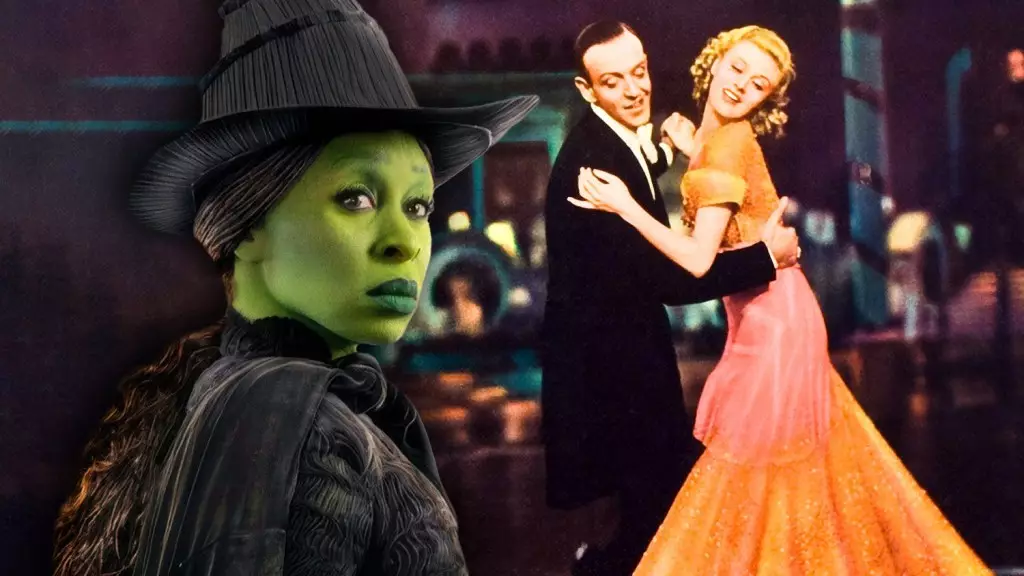The resurgence of musicals in contemporary cinema signals an intriguing shift from the buoyant optimism of classic films to a landscape marked by complexity and nuanced storytelling. Gone are the days when musicals were merely vehicles for lighthearted entertainment; today’s adaptations draw upon deep emotional struggles, societal issues, and the intricacies of human experience. As we analyze this transition, it is vital to explore how this new generation of musicals, while still financially lucrative, strays from the traditional blend of charm and joy portrayed in the golden age of Hollywood musicals.
The iconic MGM musicals, such as “Singing in the Rain” and “Top Hat,” defined an era with their upbeat tunes and whimsical storylines. These films offered escapism during tough times, providing audiences with much-needed laughter and joy. The quintessential characters portrayed by stars like Gene Kelly and Fred Astaire were often shallow yet endearing figures navigating through rom-com scenarios with an effortlessly catchy soundtrack. However, current musical offerings diverge markedly from this format.
Today’s protagonists, such as Timothée Chalamet’s Bob Dylan in the upcoming adaptation, embody a more intricate portrayal of human experience. Instead of merely charming audiences with extravagant dance numbers or catchy phrases, new characters confront distinct challenges and internal conflicts that resonate on a profound level. The struggles of identity, familial relationships, and self-discovery have found their way into the storylines of these modern musicals, reflecting the complexity of today’s society.
The evolution in musical storytelling contributes significantly to a broader narrative about societal change. For instance, the inclusion of themes such as gender identity and existential questioning in films like “Emilia Pérez” illustrates how modern audiences expect their entertainment to engage with contemporary societal issues. The characterization of a Mexican cartel boss yearning for a new identity presents a level of depth not often found in the flirty musings of yesteryear’s musicals. This shift fosters a connection between the audience and the characters, allowing viewers to see parts of themselves reflected in the struggles being presented.
The desire for complexity is also seen in figures such as Angelina Jolie’s portrayal of Maria Callas, a woman grappling with fame and personal loss. These narratives go beyond the simplistic victories of love and happiness portrayed in earlier film musicals; they explore the tensions and tribulations that define the human experience, making them relatable in ways previously unconsidered by audiences.
Despite their darker themes, the new wave of musicals is enjoying commercial success, as evidenced by the financial performance of films like “Wicked,” which grossed over $500 million. This success is mirrored by the growing number of award nominations for fresh faces in the industry, such as Selena Gomez and Ariana Grande. Although these musicals may not exude an overwhelming sense of joy, they are being recognized for their innovative approaches and emotional gravity.
This duality raises questions about the significance of awards in the musical genre. Are they celebrating artistic merit or simply banking on nostalgia and name recognition among potential viewers? While timeless classics will always hold a special place in cinematic history, the current landscape reveals an eagerness for a deeper, more relevant substance in narratives, even if it comes at the cost of traditional joy.
As we delve into the modern musical landscape, it is vital to embrace the ways these films are challenging conventions while still achieving commercial success. The emerging themes of complexity, societal relevance, and introspection reflect profound shifts in audience expectations. While the echoes of classic MGM melodies may still resonate in our hearts, today’s musicals take on a new life — one that requires their viewers to engage more deeply with the art form, moving beyond mere entertainment into realms of cultural discussions and personal reflections. The evolution of musicals encapsulates not only changes in storytelling techniques but also mirrors the intricacies of the world we inhabit, paving the way for a future where musicals continue to evolve and captivate.

Leave a Reply